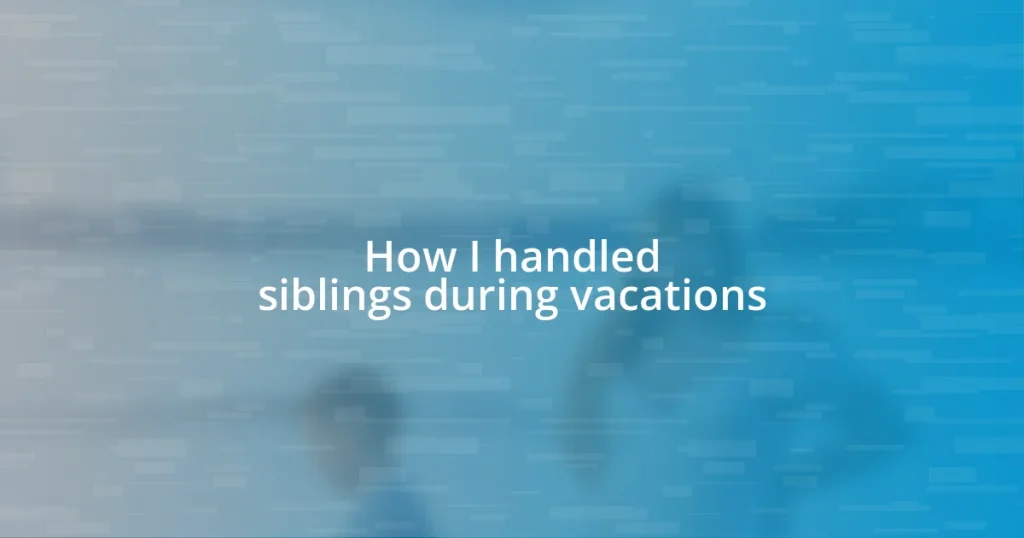Key takeaways:
- Understanding sibling dynamics involves recognizing emotional safety and shared experiences that can either strengthen or strain relationships.
- Effective vacation planning with siblings includes incorporating interests, setting a budget, maintaining flexibility, and rotating planning responsibilities to create a memorable experience.
- Encouraging teamwork through common goals and recognizing each sibling’s strengths fosters cooperation, leading to cherished memories and deeper bonds.

Understanding sibling dynamics
Sibling dynamics can often be quite complex. Growing up, I remember how my brother and I would oscillate between being the best of friends and sworn enemies, often on the same day! It’s fascinating how shared experiences, whether they’re a family vacation or just daily routines, can either strengthen or strain those bonds.
There’s something magical about how siblings know each other’s buttons—how a harmless tease can spiral into a full-blown argument. I’ve seen it happen while we were supposed to be enjoying a beach day. Wouldn’t it be interesting to consider why that happens? Maybe it’s because siblings feel safe enough to express their emotions, allowing us to let our guard down in a way we wouldn’t around our parents.
Reflecting on family trips, I often think about the unspoken alliances formed between siblings. I recall a time when my sister and I quietly teamed up against our younger brother to ‘protect’ the last piece of chocolate cake. At that moment, it wasn’t just about the cake; it was about showing solidarity and understanding the nuances of our roles within the family. Isn’t it amazing how those small moments can leave lasting impressions on our relationships?

Planning activities together
Planning activities together can feel like a balancing act with siblings, but when done right, it can transform the trip into something memorable. I remember a family vacation when my siblings and I sat down with a map of the area, each taking turns to suggest activities. It created an open space for us to share our interests. I noticed my younger sister lit up at the idea of a hiking trail, while my brother couldn’t wait to explore the local arcade. This collaborative planning made us all invested in the trip, which helped reduce any typical squabbles.
When mapping out what we could do, I find it helpful to keep some things in mind:
- Incorporate everyone’s interests: Include activities that cater to varying ages and preferences.
- Set a budget: Clear financial boundaries help reduce stress and keep expectations realistic.
- Be flexible: Have alternatives ready for those unpredictable moments when someone changes their mind.
- Rotate planning responsibilities: Let each sibling take turns in leading the planning for a day, ensuring everyone feels valued and included.
- Create shared goals: Setting family challenges, like a treasure hunt, can spur excitement and teamwork.
By blending our ideas, we create a more cohesive vacation experience. There’s a sense of camaraderie that comes when you’re all working toward the same fun—not only does it diminish the chances of conflict, but it also cultivates those cherished shared memories that we’ll reminisce about for years to come.

Setting ground rules for behavior
Setting ground rules for behavior can be a game-changer during family vacations with siblings. In my experience, laying down some basic guidelines prevents misunderstandings before they arise. For example, we agreed that once we picked our destination, everyone would have a say in how we spent our time—this allowed us to respect each other’s wishes while also keeping the peace.
I vividly recall a trip where we would often find ourselves bickering over meal choices. To tackle this, we established a simple rule: each sibling would choose a restaurant or meal for one night. This little framework reduced tension significantly, because everyone felt included. I still chuckle thinking about the time my brother recommended a sushi place, and we all hesitated because none of us liked raw fish but decided to give it a shot anyway. It turned into a hilarious night of trying new flavors and bonding over our comical reactions.
Another important aspect involves agreeing on how to handle disagreements when they inevitably crop up. We made it a point to communicate openly and resolve issues on the spot, rather than letting frustrations fester. This approach not only fostered respect but also deepened our understanding of one another. I remember a particular moment when my sister was upset about being left out of an activity. We quickly discussed it and reassured her that, whether we were together or apart, we all valued her presence. That moment really highlighted the strength of transparency in our sibling bond.
| Rule | Purpose |
|---|---|
| Inclusive Activity Planning | Ensures everyone feels involved and valued |
| Attendance Choice Rotation | Balance preferences and minimize squabbling |
| Open Communications | Prevents resentment and nurtures understanding |

Creating a fair schedule
Creating a fair schedule might seem tricky at first, but I’ve discovered that it helps set the tone for a stress-free vacation. What worked well for us was making a visual timetable, where everyone could see what activities we planned each day. I remember one trip where we mapped out our days, and my brother found it exhilarating to check off each item as we went along. It fueled his enthusiasm, reminding all of us to appreciate the journey as much as the destinations.
Involving everyone in the scheduling process made a huge difference in how we experienced our trip. I reflected on a day when we collectively decided to visit a water park. We knew our younger siblings would tire quickly, so we scheduled breaks in between rides. It was during one of those breaks, sharing laughter and snacks, that I recognized how essential it was to remain attentive to each other’s energy levels. Isn’t it funny how just a little planning can turn a day of potential exhaustion into a memorable bonding time instead?
Lastly, balancing flexibility with structure proved vital. I recall a last-minute decision to swap a planned museum visit for a spontaneous beach outing. Initially, there were mixed reactions—my sister was excited, while my brother was skeptical. However, once we arrived, we spent hours building sandcastles and playing in the waves. It turned into one of our most cherished memories! So, have you tried integrating flexibility into your plans? It often leads to delightful surprises you didn’t expect!

Managing conflicts effectively
Managing conflicts effectively during family vacations is essential, and I’ve learned that sometimes a little humor goes a long way. There was a memorable moment when my siblings and I disagreed on which beach to visit. Instead of letting it escalate, I suggested a friendly vote, but with a twist—losers had to carry the beach gear for the next trip! This lightened the mood, and we all ended up laughing. It also reminded us that even in disagreements, there’s always room for fun.
Another strategy that has proven valuable is the art of pausing before responding. I recall a time when my sister and I were at odds over how much time we should spend at the amusement park versus relaxing by the pool. Instead of a heated argument, I suggested we each take a minute to gather our thoughts. When we came back to the discussion, we each understood where the other was coming from. We compromised by splitting our day between the two. This mindful approach cultivated mutual respect and ultimately enriched our experience.
It’s also important to celebrate the moments when conflicts are resolved. I remember one trip where we had a pretty significant disagreement about what movie to watch in the evening. After we settled it with some fun movie trivia—a game where the winner would choose the film—the atmosphere changed completely. Everyone was engaged and laughing, and it felt like we not only resolved the issue but strengthened our bond. Isn’t it fascinating how conflict can sometimes lead to an unexpected camaraderie?

Encouraging teamwork and cooperation
Encouraging teamwork among siblings during vacations can create some truly unforgettable moments. I remember one family trip where we decided to split into small teams for a scavenger hunt. Each group had to work together to find specific items around our hotel. The excitement in my younger sister’s eyes as she crossed off each item was a joy to witness. Isn’t it amazing how a little friendly competition can bring siblings closer together?
One effective way I’ve found to foster cooperation is by setting common goals. On our last vacation, we aimed to document our adventures with a scrapbook. We took turns capturing photos and jotting down funny captions. It was heartwarming to see my brother’s creativity shine as he suggested quirky titles. By collaborating on this project, we created something special together that became a cherished reminder of our trip.
Additionally, recognizing each other’s strengths can boost team spirit. My brother has always been great at navigating, while my sister excels at planning snack breaks. When we noticed different talents within our crew, we started assigning roles based on those strengths. It not only made tasks easier but also made each of us feel valued. What about you—do you have siblings with unique skills? Leveraging those differences can truly enhance the experience!

Reflecting on the vacation experience
Reflecting on our vacation experiences often brings back a mix of fond memories and valuable lessons. I recall one particular trip where we visited a national park, and each sibling brought a unique perspective on our adventure. As we hiked, we took turns sharing our favorite moments, from spotting wildlife to the times we got lost. Those conversations not only opened up laughter but also deepened our understanding of each other’s viewpoints. Isn’t it interesting how sharing memories can strengthen bonds?
Sometimes, it’s the quiet moments that resonate the most. I remember sitting around a campfire, roasting marshmallows, and catching the sunset with my siblings. In that serene atmosphere, we reminisced about past vacations and reflected on how we’ve grown over the years. I felt a sense of gratitude wash over me, realizing that these experiences shape not only our adventures but also our relationships. Have you ever felt that warmth when you look back on a special family moment?
Looking back, I’ve learned that each vacation is a chapter in our family story. I often find myself chuckling at our misadventures—like the time we accidentally booked a hotel that was under renovation! While it was frustrating at the time, those incidents became the highlights of our family folklore. They remind us to embrace imperfections and find joy in unexpected circumstances. Isn’t it true that these imperfect moments often create the best stories to tell?
















